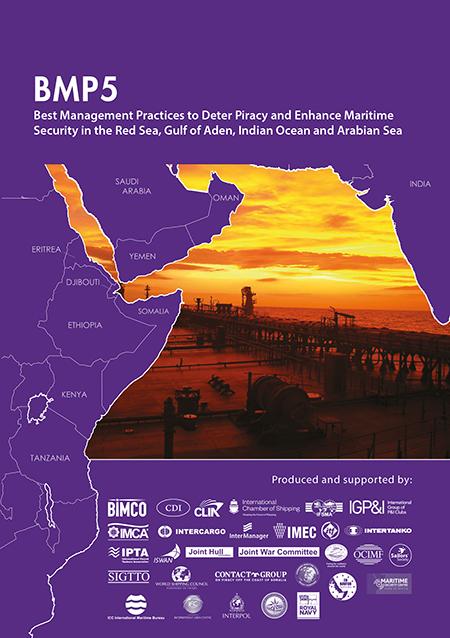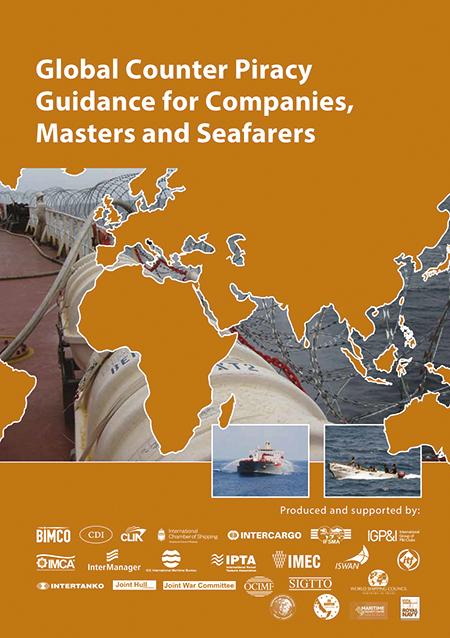"This month, we have released two long-anticipated publications: Guidelines for Offshore Tanker Operations and Marine Terminal Information Booklet: Guidelines and Recommendations. You can read more about these in the articles below."
Director's Log
At the time of writing this month’s log, I am returning from a busy few days in Brussels catching up with some of the European Union departments as they return from summer recess.

I also used the opportunity to meet with other Brussels-based industry organisations, including the European Community Shipowners' Associations (ECSA), the European Barge Union (EBU) and the European Sea Ports Organisation (ESPO).
The hot topics in our industry continue to be security and greenhouse gas emission reductions. Regardless of these organisations’ membership, and the fact that in our industry we much prefer global legislation to regional, all of the people I spoke to have similar goals to OCIMF for these two topics. We may have different opinions on how best to achieve them and whether steps discussed are practical, but we should continue to work together to find the best way to improve security and reduce emissions.
Piracy and security in the Gulf of Guinea has been on our minds more than usual lately, with increasing numbers of reported incidents off the West African coast. OCIMF will continue to work with governments, our members and other organisations to try to address the issues. Electronic versions of the industry publications Global Counter Piracy Guidance for Companies, Masters and Seafarers and BMP5: Best Management Practices to Deter Piracy and Enhance Maritime Security in the Red Sea, Gulf of Aden, Indian Ocean and Arabian Sea were released in June and I’m happy to say that hard copies of both are now also available.
This month, we have released two long-anticipated publications: Guidelines for Offshore Tanker Operations and Marine Terminal Information Booklet: Guidelines and Recommendations. You can read more about these in the articles below.
We are also continuing to lay the groundwork for OCIMF’s longer-term strategy. A high-level outline will be presented to our Executive Committee (ExCom) in November for review, with the aim of kicking off the strategy study in December. Our objective is to complete the first phase by June 2019.
I hope you enjoy this month’s articles and wish you all a happy October.

Rob Drysdale
Director OCIMF
Do you have news that you'd like to share with our readers? If so email
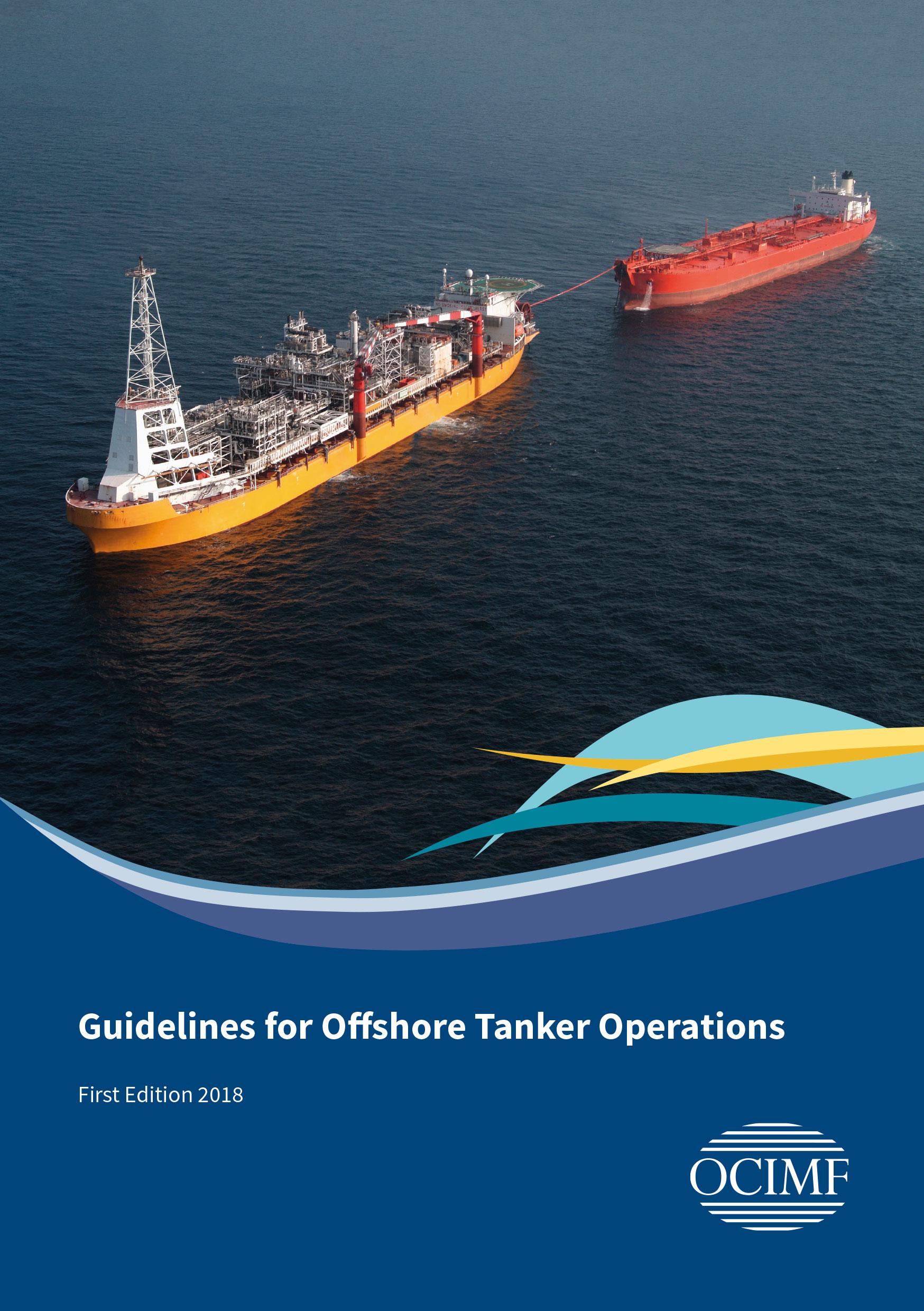
Guidelines for Offshore Tanker Operations
OCIMF is proud to present Guidelines for Offshore Tanker Operations, released 13 September.
This is the second book OCIMF has released for the offshore industry this year, following on from the release of Cargo Guidelines for F(P)SOs in July.
Guidelines for Offshore Tanker Operations provides guidance on equipment and procedures for mooring and transferring crude oil and other petroleum products between offshore terminals and offtake tankers, in particular F(P)SO and SPM buoy terminals and conventional and DP tankers.
This new book is designed to promote compatibility and harmonisation between offshore terminals and offtake tankers so that cargo can be transferred safely. It should be essential reading for tanker technical operators, terminal operators, tanker- and terminal-based personnel, offshore project development teams, regulatory officials and anyone involved in these operations.
The following OCIMF books have now been superseded and withdrawn: Offshore Loading Safety Guidelines with Special Relevance to Harsh Weather Zones, Tandem Mooring and Offloading Guidelines for Conventional Tankers at F(P)SO Facilities and Recommendations for Equipment Employed in the Bow Mooring of Conventional Tankers at Single Point Moorings.
Buy Guidelines for Offshore Tanker Operations
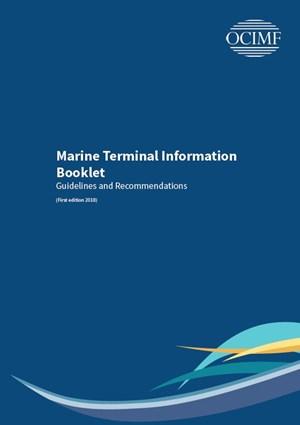
Marine Terminal Information Booklet
OCIMF released a new information paper, Marine Terminal Information Booklet: Guidelines and Recommendations, on 18 September.
A vessel’s arrival into port is a high-risk activity, but this risk can be reduced if there is easy access to accurate and up-to-date terminal, berth and port information.
This paper gives terminal operators a template for presenting important terminal and port information in a booklet, for easy reference by vessel personnel, vessel owners, operators, charterers and others.
This information paper replaces OCIMF’s Port and Terminal Information paper (1 September 1997).
Download Marine Terminal Information Booklet
MEG4 videos
OCIMF has released four videos that introduce the Mooring Equipment Guidelines, Fourth Edition (MEG4) and highlight key changes since the previous edition.
The videos are available to download and share on the MEG4 page.
1. An introduction to MEG4. Introduces the book, explains the background to the revisions, sets out key changes and explains the book’s new emphasis on considering the mooring system as a whole. from
2. Mooring system design principles. Sets out the core principles of mooring system design, including the standard environmental criteria, the ship design MBL and the principle of aligning design and construction of all elements of the mooring system from the outset.
3. Purchasing and monitoring mooring lines and tails. Introduces new guidance on purchasing and monitoring mooring lines and tails, which has been greatly enhanced in MEG4.
4. Human factors. Explains the importance of considering human factors during design and highlights key areas for designers to consider.
BMP5 and Global Counter Piracy Guidance printed copies out now
Printed copies of BMP5: Best Management Practices to Deter Piracy and Enhance Maritime Security in the Red Sea, Gulf of Aden Indian Ocean and the Arabian Sea and Global Counter Piracy Guidance for Companies, Masters and Seafarers are now available from Witherby Publishing.
The printed copies are available for free, thanks to the generous support of the co-authors: Baltic and International Maritime Council (BIMCO), International Chamber of Shipping (ICS), International Federation of Shipmasters' Associations (IFSMA), International Group of Protection & Indemnity Clubs (IGP&I), Intercargo, Intermanager, INTERTANKO and OCIMF.
Electronic copies were released in June and are available to download from Maritime Global Security and OCIMF.
OCIMF factsheets available in Spanish and Chinese
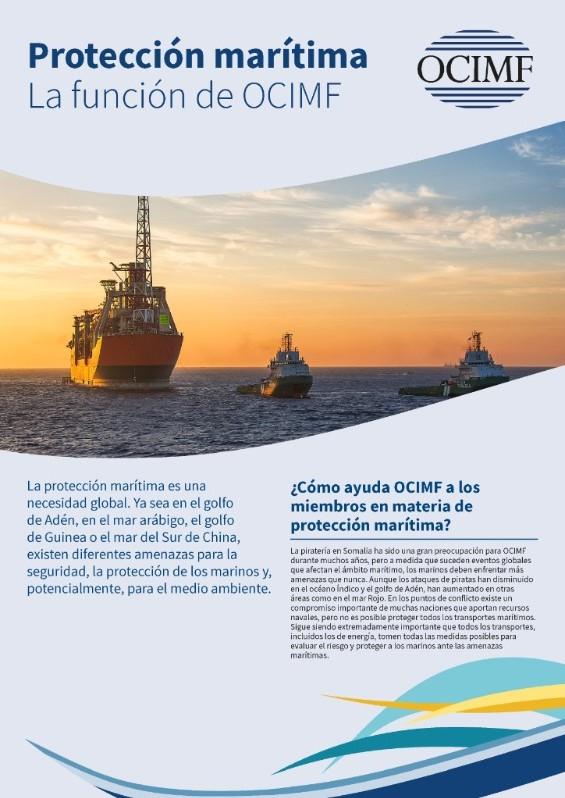

OCIMF factsheets are now available in English, Spanish (Latin American) and Chinese (Mandarin). The factsheets provide brief introductions to key OCIMF programmes and activities, and can be downloaded from the OCIMF website.
- About OCIMF and membership.
- Committee structure.
- Maritime security.
- How OCIMF adds value at the IMO.
- Shipping in the Arctic region.
- Ship Inspection Report programme (SIRE).
- Offshore Vessel Inspection Database (OVID).
- Marine Terminal Information System (MTIS).
- Books.
- Information papers.
Printed versions are also available: email
Middle East Regional Marine Forum
The Middle East Regional Marine Forum will be held 13–14 November in Dubai, United Arab Emirates.
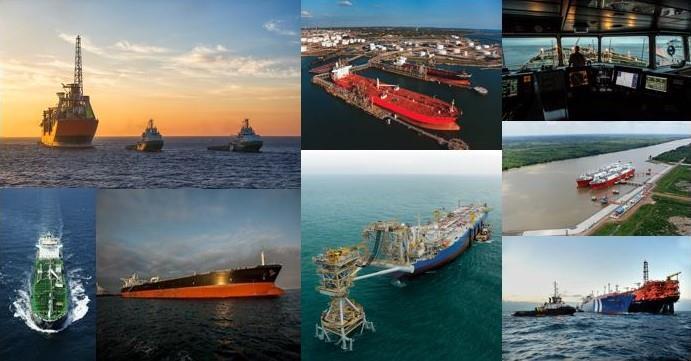
An agenda and further details will be available soon on the OCIMF website.
All Regional Marine Forums are free of charge and open to both OCIMF members and non-members. Attendance is limited to registered participants only.
OCIMF meeting updates
Maritime Security Sub-committee
13th meeting: 4 September 2018, London, UK
The committee received regional operational updates from a director of the Interregional Coordination Centre in Cameroon on progress with the Yaoundé Code of Conduct. After launching BMP5 and Guidelines to Harden Vessels the group is now focussing on producing a hull vulnerability information paper and reviewing guidance for the Gulf of Guinea.
Next meeting: 13 December 2018, London, UK
Polar Water Operations Manual Working Group
3rd meeting: 4–5 September 2018, London, UK
Next meeting: 23 November 2018
Human Factors Focus Group
1st meeting: 6–7 September 2018, London, UK
The Human Factors Focus Group met formally for the first time. It reviewed its Terms of Reference and progressed work on developing the OCIMF strategy on human factors. The group agreed on its integral role in the ongoing Vessel Inspection Programme project and International Safety Guide for Oil Tankers and Terminals (ISGOTT), 6th edition.
Next meeting: November 2018 (TBC)
Cyber Working Group
13th meeting: 11 September 2018, London, UK
The working group reviewed the latest draft of Guidelines on Cyber Security onboard Ships (version 3) and discussed priorities.
Next meeting: 19 December 2018, London, UK
OVID Focus Group
17th meeting: 12–13 September, Singapore (hosted by Shell)
The group discussed:
- OVID inspection compliance.
- Inspector accreditation and training schedule.
- Terms of Reference for reviewing the accreditation and training programme.
- Inspectors’ industry relationship.
- OVID member conduct and accountability.
- Update on Offshore Vessel Management and Self Assessment, Second Edition (OVMSA2).
- Feedback from the OVID User Group.
- The OVID Collaboration Committee between OCIMF and IMCA.
Next meeting: 20–21 February 2019, Houston, USA (hosted by ExxonMobil)
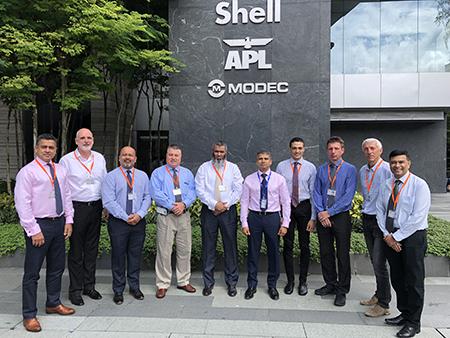
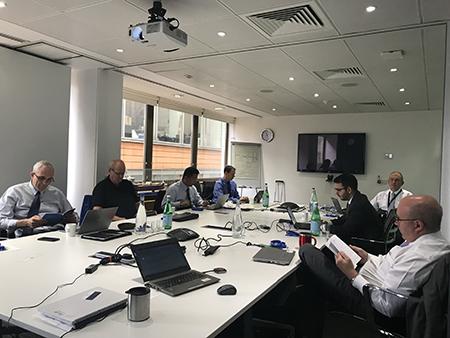
OVID User Group
17th meeting: 11 September 2018, Singapore
The group discussed a potential new arrangement in which payments for inspections are made directly from the vessel operator to OVID inspectors. Aligning the payment process with SIRE is also being considered. The OCIMF Legal Committee will review this issue in detail in the October meeting. The review of OVMSA and involvement of vessel operators was also discussed, and the review will have input from International Marine Contractors Association (IMCA) members.
Next meeting: 19 February 2019, Houston, USA
ISGOTT revision project
Steering Group, 2nd meeting: 10 September, London, UK
Primary Working Group, 3rd meeting: 11–12 September, London, UK
Marine Terminal and Tanker Interface Working Group and Tanker Working Group: 12–13 September, London, UK
The Steering Group met for an update on ISGOTT revision progress and provided additional guidance and support to the Primary Working Group, the Tanker Working Group and the Marine Terminal and Tanker Interface Working Group, who met immediately afterwards to work on the revisions.
Next meetings:
Primary Working Group: 20–21 November, London, UK (hosted by ICS)
Marine Terminal and Tanker Interface Working Group and Tanker Working Group: 21–22 November, London, UK (hosted by ICS)
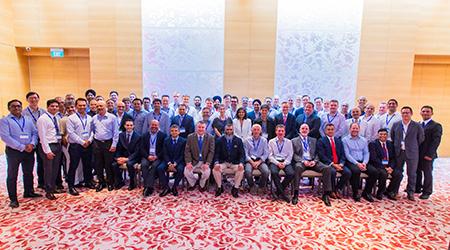
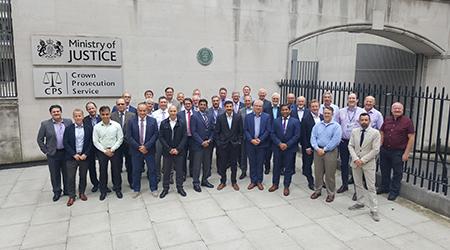
Marine Technical Sub-committee
37th meeting: 18–20 September 2018, Stavanger, Norway
The committee reviewed:
- Regulatory round-up by DNV GL addressing current and emerging issues.
- Vessel environmental technology updates by Exmar, Shell and Teekay.
- Air emission presentations by DNV GL, NMA and SINTEF Ocean AS.
- OCIMF Secretariat updates on IMO activities, ISGOTT and the Vessel Inspection Programme project.
Next meeting: 12–14 February 2019, Houston, USA
F(P)SO Questionnaire Working Group
6th meeting: 18–20 September, St. John’s, Canada (hosted by Husky Energy)
The working group is now reviewing a second edition of the 2016 information paper Guidelines on the Marine Assessment of F(P)SOs Assessment Criteria and Questionnaire, which will take more FP(S)O-specific features into account. The second edition of the guidelines is now in draft stage and expected to be released in mid-2019.
Next meeting: 8–9 January 2019, London, UK
Floating Systems Group
17th meeting: 20–21 September, St. John’s, Canada (hosted by Husky Energy)
New Terms of Reference were developed for two forthcoming publications: FP(S)O Heading Control and Station-Keeping Guidelines and Ballast Water Management for Offshore Units. Chevron gave a presentation on the Unmanned Aerial Vehicle (UAV) inspection of FP(S)O cargo tank deck heads. Members discussed high-resolution cameras with sophisticated zoom functions as an alternative or supplement to UAVs, which can also be used at deck level for external visual inspections at height.
Next meeting: 6–7 March 2019, Amsterdam, Netherlands (hosted by Bluewater)
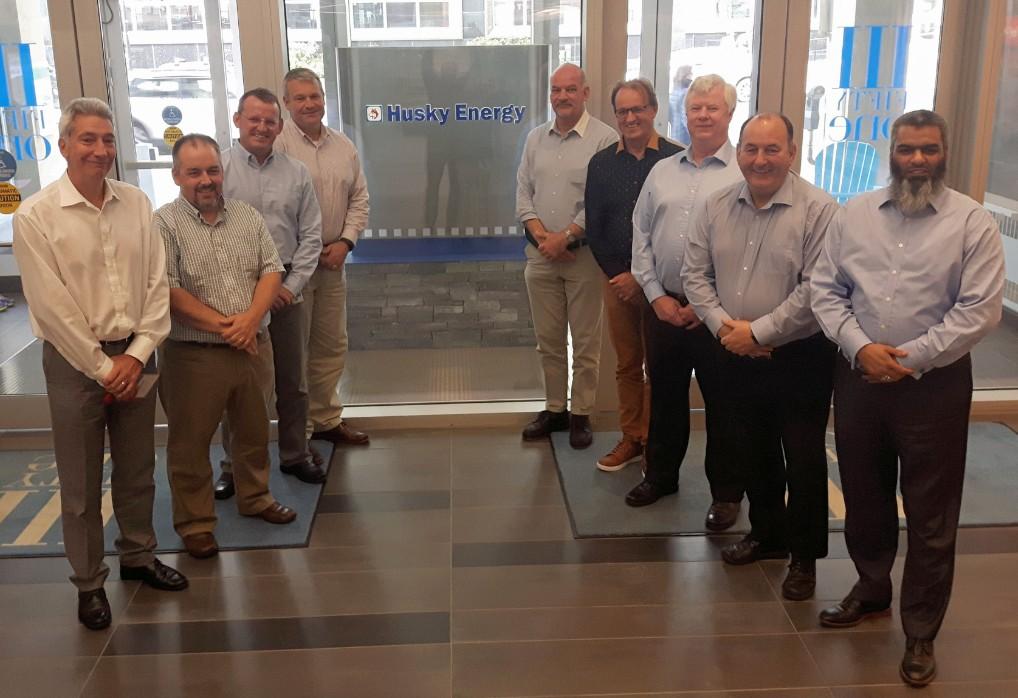
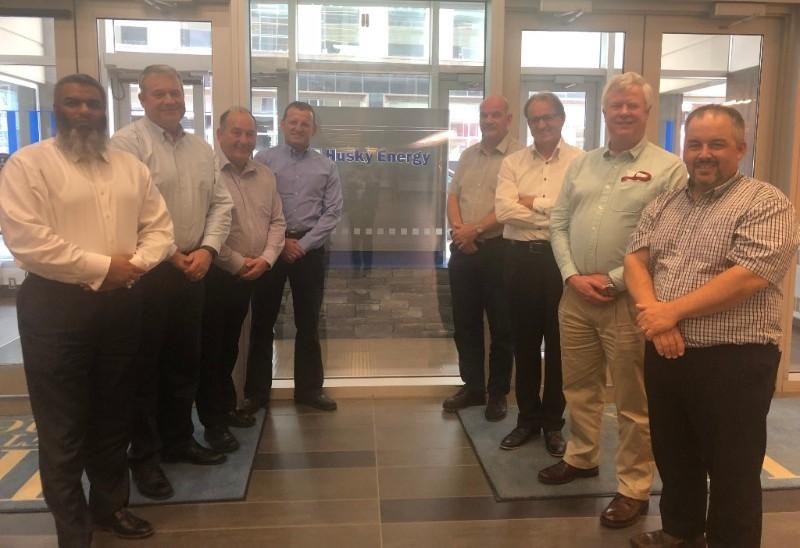
News from the IMO
The Sub-Committee on Carriage of Cargoes and Containers (CCC) held its 5th session 10–14 September.
Interim guidelines for ships using methyl/ethyl alcohol as fuel
The Sub-Committee agreed in principle to draft interim guidelines for the safety of ships using methyl/ethyl alcohol as fuel. The Maritime Safety Committee (MSC) was invited to refer specific paragraphs to other technical sub-committees for consideration and for advice at CCC 6. The interim guidelines will cover the arrangement, installation, control and monitoring of machinery, equipment and systems using methyl/ethyl alcohol as fuel to minimise risk to the ship, its crew and the environment, taking into account the nature of the fuels involved.
Safety provisions for ships using fuel cells
The Sub-Committee agreed to develop interim guidelines as safety provisions for ships using fuel cells that cover installation, fire safety and other relevant matters. The Sub-Committee instructed the correspondence group on the safety of ships using low-flashpoint fuels to develop relevant draft interim guidelines.
Draft amendments to IGF Code agreed
Draft amendments to the International Code of Safety for Ships using Gases or other Low-flashpoint Fuels (IGF Code) were agreed, relating to the protection of the fuel supply for liquefied gas fuel tanks, aimed at preventing explosions. The Sub-Committee agreed the final proposed text for approval by the MSC.
Use of low-flashpoint diesel as marine fuel
The correspondence group on low-flashpoint diesel as marine fuel was instructed to discuss a proposal to carry out a formal safety assessment study for ships fuelled by low-flashpoint diesel (diesel fuel with a flashpoint of less than 60°C) and report back to CCC 6.
Interim guidelines on steel for cryogenic service agreed
The Sub-Committee agreed draft interim guidelines on the application of high manganese austenitic steel for cryogenic service, for submission to MSC 100 in December 2018 for approval. The interim guidelines aim to ensure the safety of ships carrying or fuelled by LNG by specifying the requirements for high manganese austenitic steel in cargo and fuel tanks that comply with the International Gas Carrier (IGC) and IGF Codes. The Sub-Committee also approved draft amendments to the IGC and IGF Codes concerning tensile tests for materials other than aluminium alloys, with a view to approval and adoption by the MSC. A correspondence group was re-established to look at the procedure for considering and approving alternative metallic material for cryogenic service in the IGC and IGF Codes, and to gather and evaluate information on design and production when using high manganese austenitic steel for cryogenic service. The group will report back to CCC 6.
OCIMF members are encouraged to contact Sam Megwa at
The Sub-Committee on Implementation of IMO Instruments (III) held its 5th session 24–28 September.
Reports on alleged inadequacy of port reception facilities
The Sub-Committee discussed the development of an action plan by MEPC to address marine plastic litter from ships and recognised the importance of adequate port reception facilities to prevent plastics from entering the marine environment. There were 75 reported cases of alleged inadequacies of port reception facilities – five more than in 2016. The reports addressed 244 waste categories in 36 different countries or territories. Over 85% of all cases were related to waste categories under the International Convention for the Prevention of Pollution from Ships (MARPOL) Annex V: plastics, domestic waste and operational waste. This issue will be considered further at MEPC 73.
Exemption of survey and certification requirements for unmanned UNSP barges
An IMO Drafting Group was tasked with finalising draft amendments to MARPOL Annexes I, IV and VI and the associated guidelines for exemption of non-self-propelled (UNSP) barges from the survey and certification requirements under MARPOL. The draft amendments will be submitted to MEPC 74 for approval.
World Maritime Day 27 September
The IMO celebrated World Maritime Day with the theme "IMO 70: Our Heritage – Better Shipping for a Better Future". This year, it celebrates 70 years since the Convention establishing the IMO was adopted. This was an opportunity to reflect on the IMO’s success and its important work addressing current and future challenges in maritime transport.
OCIMF IMO Survey
Thank you to everybody who took the time to complete the OCIMF IMO survey. We are analysing the results and will report back to members soon.
2019 SIRE, ECDIS and OVID course dates
SIRE New Inspector courses
| 11–15 February 2019 | Singapore |
| 29 April–3 May 2019 | London |
| 3–7 June 2019 | Houston, USA |
| 14–18 October 2019 | Singapore |
| 25–29 November 2019 | London |
New CAT1 inspector applicants must hold and submit an Electronic Chart Display Information System (ECDIS) course certificate at the time of registration. The course must be classroom based; this does not need to be the IMO model course.
CAT3 North America and South America course dates for 2019 will be announced later in the year. Registration will be possible once the dates are confirmed.
SIRE Refresher courses
| 18–19 February 2019 | Singapore |
| 7–8 May 2019 | London |
| 10–11 June 2019 | Houston, USA |
| 21–22 October 2019 | Singapore |
| 12–13 November 2019 | London |
ECDIS courses
| 20 February 2019 | Singapore | Course full; reserve list open |
Any CAT1 inspectors who did not attend a full OCIMF ECDIS accreditation course prior to 2017 are required to attend a one-day OCIMF ECDIS course. This is not an operational course, but will train inspectors on how to effectively question an officer to determine their knowledge of the ECDIS system. These courses will run in conjunction with Refresher courses if possible.
For more information on how to register please visit the SIRE website.
2019 OVID New Inspector courses
| 21–23 January 2019 | Austratra |
| 25–27 February 2019 | Houston, USA |
| 11–13 March 2019 | Aberdeen |
| 13–15 May 2019 | London, UK |
| 1–3 July 2019 | Norway |
| 15–17 July 2019 | Singapore |
| 22–24 July 2019 | Malaysia |
| 3–5 November 2019 | Saudi Arabia |
| 17–19 November 2019 | Qatar |
2019 OVID Refresher courses
| 24–25 January 2019 | Australia |
| 28 February–1 March 2019 | Houston, USA |
| 14–15 March 2019 | Aberdeen, UK |
| 16–17 May 2019 | London, UK |
| 4–5 July 2019 | Norway |
| 18–19 July 2019 | Singapore |
| 25–26 July 2019 | Malaysia |
| 6–7 November 2019 | Saudi Arabia |
| 20–21 November 2019 | Qatar |
More information on how to register is on the OVID website.
Please sign up early to avoid disappointment. Please refer to the earlier announcement regarding our OVID minimum inspection requirements. If you have not met the minimum inspection requirements in 2018, you will be required to attend a three-day New Inspector course to revalidate your accreditation.
All courses will only run if there are enough attendees.


